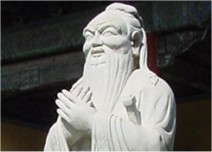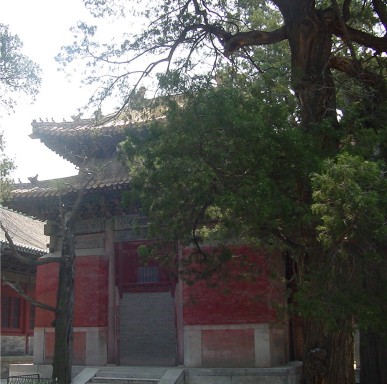
Aside
from a wooden sculpture, attributed to Tzu Kung (a disciple of Confucius),
there are no pieces of evidence to suggest what Confucius looked like. Piecing
together descriptions of his father, along with the historical details of
Chinese men of the period, it is believed that he was a fairly tall man in
comparison to his contemporaries, with easily discernible features. The conversations,
discourses, anecdotes and wisdom recorded in the Lun Yu gives the impression
of a man of gentle compassion, with a bearing of utmost dignity. He was formal
in his conduct, but at the same time a genial sort of man. He was eloquent,
serious and without doubt enlightened well beyond his day. He lived by courtesy,
filial piety, the virtues of benevolence,
righteousness, loyality and trust. In his ideal world, these were the things
that would prevail above all others. Something of a meritocrat, Confucius'
views on government and society were that all people had a rôle to
fulfil, and that as such they all had equality of value. Any ruler should
lead by benevolence, and by his own virtues induce these same virtues in
others. The Confucian lifestyle that he advocated was one of good standards,
moral education and the rites. In his utopia, all these things would combine
to form what is best translated as a "commonwealth state." Confucius
himself was a perfect nobleman who cultivated the arts of the time. He was
also a musician, and held great respect for music, which to him was the
mark of a superior man, and could unmask deception and hypocrisy by mirroring
the inner soul. In terms of rites, Confucius was to regard spirtuality above
physicality - though at the same time he warned against resting too much
on the spirit world and too little on the real world. Human beings were
to him the pinnacle of existence, and only by asserting the key Confucian
principle of ren could mankind truly attain transcendence. True to his word and his principles, there can
be little doubt that Confucius was the definitive Chinese sage, statesman,
philosopher and gentleman.
